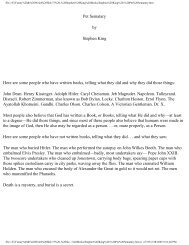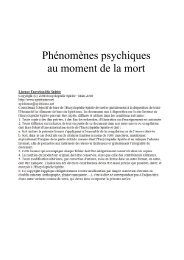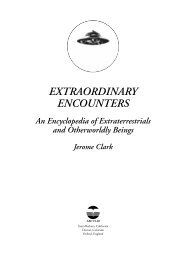Create successful ePaper yourself
Turn your PDF publications into a flip-book with our unique Google optimized e-Paper software.
128 PASSPORT TO MAGONIA<br />
Pererius observes very well in Commentary on Genesis, Chapter Six,<br />
all the strength, all the power of the human sperm, comes from<br />
spirits that evaporate and vanish as soon as they issue from the<br />
genital cavities where they were warmly stored. The physicians agree<br />
on this. Therefore, it is not possible for the demon to keep the sperm<br />
he has received in a sufficient state of integrity to produce generation;<br />
for, no matter what the vessel where he could attempt to keep<br />
it is, this vessel would have to have a temperature equal to the<br />
natural temperature of human genital organs, which is found nowhere<br />
but in those same organs. Now, in a vessel where the warmth<br />
is not natural, but artificial, spirits are resolved, and no generation<br />
is possible. A second objection is that generation is a vital act through<br />
which man, from his own substance, introduces sperm through the<br />
use of natural organs, into a place proper for generation. To the<br />
contrary, in the special case we are now considering, the introduction<br />
of the sperm cannot be a vital act of the generating man, since<br />
it is not by him that it is introduced into the matrix. And, for the<br />
same reason, it cannot be said that the man to whom the sperm<br />
belonged has engendered the fetus that is procreated. Neither can<br />
we consider the incubus as the father, since the sperm is not of his<br />
own substance. Thus here is a child who is born and has no father—<br />
which is absurd. Third objection: when the father engenders naturally,<br />
there is a concourse of two causalities: a material one, for he<br />
provides the sperm that is the material of generation; and an efficient<br />
one, for he is the main agent in the generation, according to the<br />
common opinion of philosophers. But, in our case, the man who<br />
does nothing but provide the sperm simply gives material, without<br />
any action tending toward generation. Therefore he could not be<br />
regarded as the child's father, and this is contrary to the notion<br />
that the child engendered by an incubus is not his child, but the<br />
child of the man whose sperm was borrowed by the incubus. . . .<br />
We also read in the Scriptures (Genesis 6:4) that giants were<br />
born as a result of intercourse between the sons of God and the<br />
daughters of Man: this is the very letter of the sacred text. Now,<br />
these giants were men of tall stature, as it is said in Baruch 3:26,<br />
and far superior to other men. Besides their monstrous size, they<br />
called attention by their strength, their plunders, their tyranny, And<br />
it is to the crimes of these giants that we must attribute the main<br />
and primary cause of the Flood, according to Cornelius a Lapide<br />
in his Commentary on Genesis.<br />
Some state that under the name of sons of God we must understand<br />
the sons of Seth, and, under that of daughters of men, the<br />
daughters of Cain, because the former practiced piety, religion, and<br />
all other virtues while the latter, the children of Cain, did exactly<br />
the opposite. But, with all the respect we owe Chrysostom, Cyril,<br />
TO MAGONIA . . . AND BACK! 129<br />
and others who share this view, it will be recognized it is in disagreement<br />
with the obvious meaning of the text. What do the Scriptures<br />
say? That from the conjunction of the above were born men of<br />
monstrous corporeal proportions. Therefore, these giants did not<br />
exist previously, and if their birth was the result of that union, it is<br />
not admissible to attribute it to the intercourse between the sons of<br />
Scth and the daughters of Cain who, of ordinary size themselves,<br />
could have children only of ordinary size.<br />
Consequently, if the intercourse in question has given birth to<br />
beings of monstrous proportions, we must see there not the ordinary<br />
intercourse of men with women but the operation of the incubi who,<br />
owing to their nature, can very well be called sons of God. This<br />
opinion is that of the Platonist philosophers and of Francois George<br />
of Venice, and it is not in contradiction with that of Josephus the<br />
historian, Philo, St. Justin Martyr, Clement of Alexandria, and<br />
Tertullian, according to whom these incubi could be angels who<br />
had allowed themselves to commit the sin of luxury with women.<br />
Indeed, as we shall show, there is nothing there but a single opinion<br />
under a double appearance.<br />
What we have here is a complete theory of contact between<br />
our race and another race, nonhuman, different in physical nature,<br />
but biologically compatible with us. Angels, demons, fairies,<br />
creatures from heaven, hell, or Magonia: they inspire our strangest<br />
dreams, shape our destinies, steal our desires. . . . But who<br />
are they?





